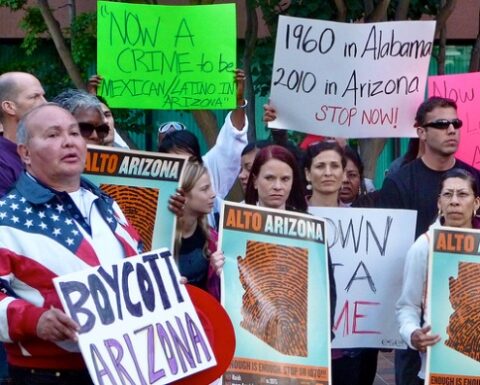Interior Enforcement

New Arizona Enforcement Law Sparks Calls for Economic Boycott
Arizona’s new controversial enforcement law, signed into law last week by Gov. Jan Brewer, has the potential to shake down more than just undocumented immigrants and suntanned citizens. Arizona’s businesses and tourism industry are also likely to take a hit as more and more people call for an economic boycott. The law, which requires state and local law enforcement to check the documents of people they “reasonable suspect” of being here illegally, is causing many potential investors, visitors and tourists to avoid Arizona altogether. With a state budget deficit of more than $4.5 billion and an economy heavily dependent on tourism, Gov. Jan Brewer (who’s up for reelection this November) and the Arizona legislature will need to consider not only how they plan on paying for implementation of this new law, but also how to pay the larger price of doing business in a restrictionist state. Read More

Can Arizona Afford to Implement S.B. 1070?
As the deadline for signing/vetoing Arizona’s immigration enforcement law (S.B. 1070) draws near, Arizona Governor Jan Brewer has more than just the moral and ethical implications of the law to consider. The proposed “Support Our Law Enforcement and Safe Neighborhoods Act,” a bill that makes it a misdemeanor to fail to carry proper immigration documents and requires police to determine a person’s immigration status, could come with heftier price tag than people may realize. While the Arizona legislature has not yet determined the costs associated with S.B. 1070 (the state legislature failed to attribute a cost in their attached fiscal note), several economic indicators reveal the potential cost of implementation to Arizona taxpayers and the residual consequences of driving unauthorized immigrations out of Arizona. Read More

Turning Up the Heat on Immigration: New Arizona Law Spurs Need for Immigration Reform
The passage of Arizona’s proposed anti-immigration enforcement law (SB 1070) last week has spurred an outcry of critical voices—including the Arizona Association of Chiefs of Police, religious leaders, immigration advocacy groups and a slew of political leaders—disavowing the bill as a license to racially profile and as “open season on the Latino community.” The proposed law, which Arizona Governor Jan Brewer is expected to sign Saturday, encourages Arizona police officers to investigate immigration status based on a “reasonable suspicion” that a person is in the country illegally. Yet, as the proposed law continues to garner media attention for its harsh and draconian spirit, it has also unintentionally shifted public and congressional attention toward reforming our entire federal immigration system—an overhaul that would likely discourage states like Arizona from taking federal immigration enforcement into their own hands. Read More

Razing Arizona: How Local, State and Federal Authorities are “Rooting Out” Arizona’s Immigration Problems
A perfect storm hit the state of Arizona this week. On Tuesday, the Arizona House passed SB1070—a bill which would compel local police officers to investigate people’s immigration status based on a “reasonable suspicion” he/she was in the country illegally. Two days later, Arizona residents witnessed local police descending onto their streets (along with hundreds of ICE and other federal enforcement agents) in a sweep of 52 people suspected to be part of a large-scale human-smuggling ring. More than 800 law enforcement officers took part in what was dubbed “Operation in Plain Sight”—the result of a year-long investigation targeting transportation companies allegedly involved in smuggling unauthorized immigrants across the border. According to ICE, the agents and officers represented nine federal, state, and local law enforcement agencies resulting in a large and disproportionate show of force, as 54 suspects were taken into custody. Arrests were made in Phoenix, Tucson, Nogales, and Rio Rico, as well as in Nogales, Mexico. Those arrested were charged with serious crimes—including money laundering, alien smuggling, and conspiracy. Read More

Punitive Arizona Immigration Measure Makes Headlines (Again)!
Arizona has made national headlines again. It is not a moment of pride. On Tuesday, the Arizona House of Representatives passed SB 1070, a bill that makes it a misdemeanor to fail to carry proper immigration documents and requires police to determine a person’s immigration status if they have “reasonable suspicion” that the person is an unauthorized immigrant. The bill passed along party lines, and Republican Gov. Jan Brewer is expected to sign the bill. If she does, it will usher in a new, shameful era of profiling and abuse. For the Latino community, most of whom have families with roots that go back generations and whose culture is an integral part of Arizona, it means that they will be required to carry papers proving that they belong. The suspicion, anger, and resentment will be palpable. Read More

Immigration Advocates Call for an End to ICE’s Failed 287(g) Program
Today, a group of immigration reform advocates called for an end to the controversial 287(g) program, labeling it a “failed experiment.” Speakers from labor organizations and immigration advocacy groups said the expansion and continued failure of this enforcement program is a “worrying signal on the President’s commitment” to reforming our immigration system. They went as far as to say that “the only thing that has changed since George Bush left the White House is that now President Obama is sanctioning Sheriff Joe (the controversial Arizona Sheriff) to terrorize Latinos.” Read More

Immigration Reform: The Not So Merry Go Round of Washington Politics
First, Republicans said they wouldn’t work with Democrats on immigration if health care passed—now they will. The Obama administration announced that immigration enforcement would target dangerous criminals only—but as it turns out, they aren’t. Senator Chuck Schumer said we’re moving forward on immigration, while his partner, Senator Lindsey Graham, insists that the President write a bill and take the lead first. Senator John McCain was a staunch immigrant supporter—that is, until he received political challenges from the right. Lou Dobbs hates immigrants—or does he? Immigration reform is dead, alive, dead, no alive. Our nation is facing a deficit and immigration reform could help fill the hole—but some feel that reform is too big a lift. If you aren’t studying the day-to-day actions of politicians and administration types in Washington, you can miss a lot. And if you are, it’s all a bit dizzying. Read More

ICE Slip Up Casts Serious Doubt on Immigration Enforcement Strategy
Over the last week, there has been a great deal of outrage, confusion, and backtracking on the issue of who and how many people the U.S. government deports. Faced with a great deal of criticism for Bush-style enforcement, the Administration announced last year that it would no longer be conducting large scale worksite raids, and that worksite enforcement would focus on employers. At the same time, the Administration also stated that it would shift the focus of enforcement to “criminal aliens”—the “worst of the worst.” Programs like Secure Communities, which identifies immigrants who are in local jails and are deportable, have helped to make that shift—at least in rhetoric (whether or not immigrants identified as criminals are really criminals is another post). Read More

Committee Hearings on Visa Application Costs and Overstays Show Partisan Divide
This week, members of the House of Representatives held hearings dealing with visa application costs and visa overstays—and the partisan divide between Democrats and Republicans was as clear as ever. As Congress and immigration experts continued to debate the specifics of visa processing and overstays, the need for an entire immigration overhaul—an overhaul that would tackle these issues and others more directly and on a larger scale—became even more apparent. Read More

Wide Cast of Characters Discuss the Benefits of Legalization
While comprehensive immigration reform (CIR) remains stalled somewhere between the House, Senate, and the Administration, four noted experts were interviewed by the Council on Foreign Relations (CFR) about how immigration reform would affect the U.S. economy. These interviews were posted on CFR’s website yesterday. David Scott Fitzgerald, Associate Director for the Center for Comparative Immigration Studies at the University of California, San Diego; Heidi Shierholz, an economist for the Economic Policy Institute; Mark Krikorian, Executive Director for the Center for Immigration Studies; and James Carafano, Director for Foreign Policy Studies at the Heritage Foundation offered opinions on immigration and the economy. While their opinions varied widely, there were notable areas of agreement: our system is in need of repair, and legalization would not be the great harm to our economy that restrictionists tout. Read More
Make a contribution
Make a direct impact on the lives of immigrants.
